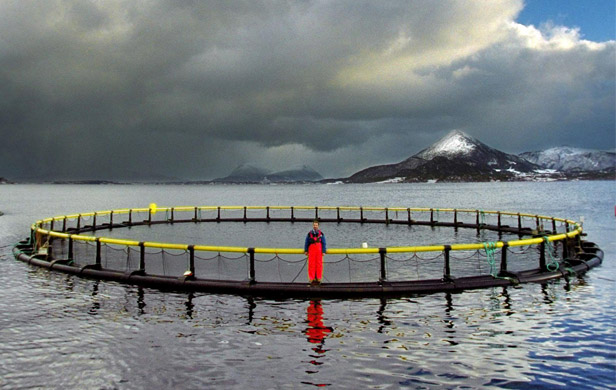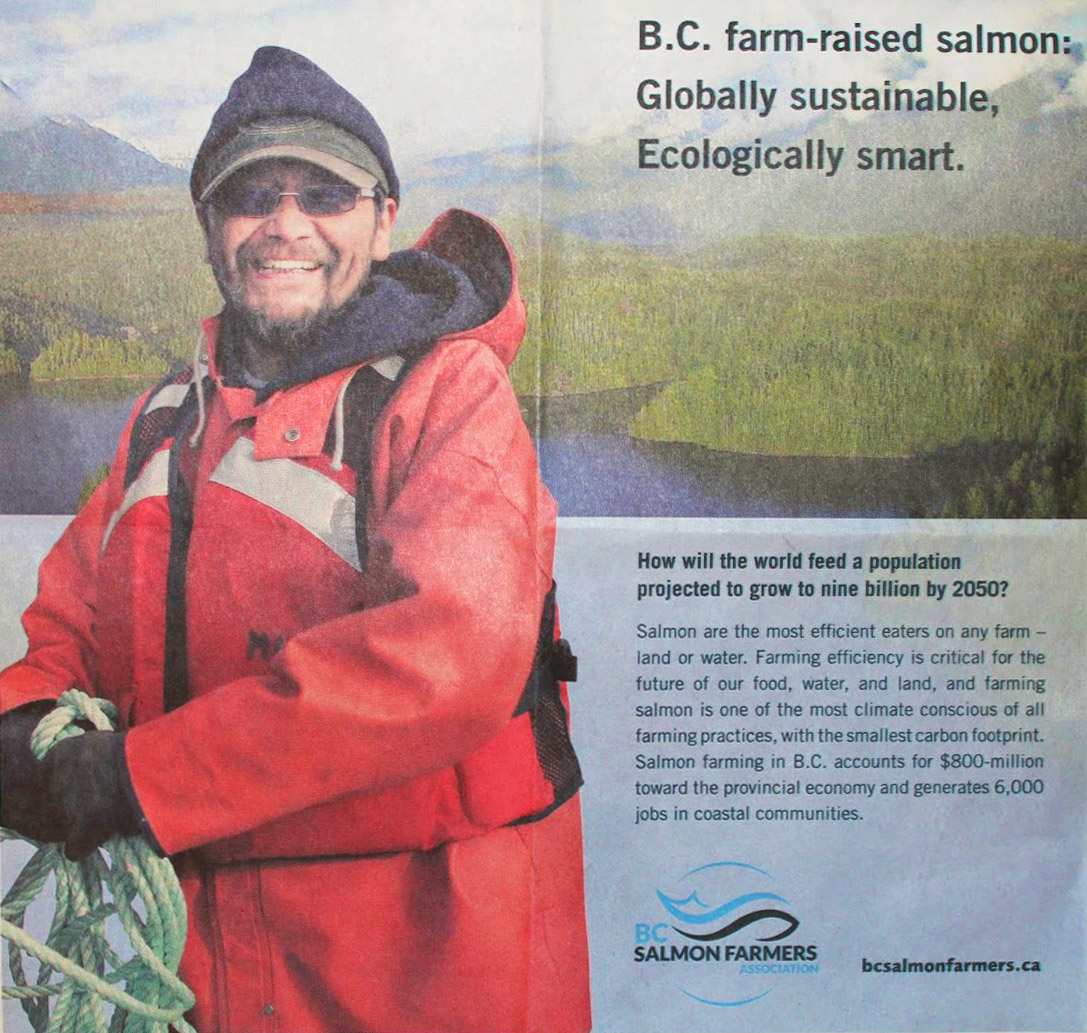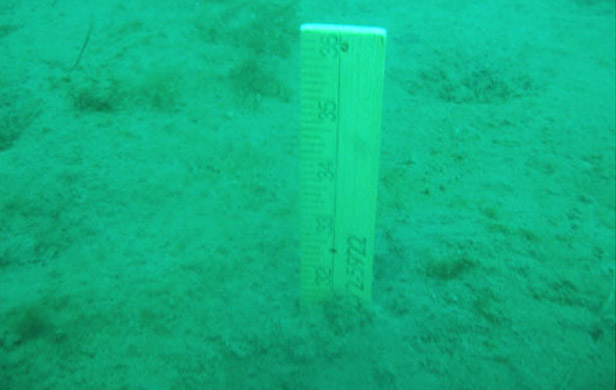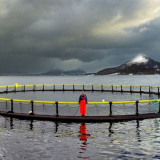
The BC Salmon Farmers’ Association continues to make assertions about open-net fish farms that don’t agree with the science, as a recent ad in the Globe and Mail demonstrates. It is surprising the industry, lead companies including the Norwegian Marine Harvest, Cermaq and Grieg Seafood, uses the same spin they have been doing for decades and simply ignore the evidence.
My guess is the timing of the ad (Nov 5, 2014, Page S3) is just before the federal government will announce the aquaculture activities regulations that allow fish farms to continue using the ocean as a free open sewer and even further allow them to release other chemicals, not to mention, as some pundits taking DFO to court put it, they will be allowed to kill wild salmon.

Race to the sewage-covered bottom
This is a race to the bottom because fish farms like to say they operate under the strictest laws in the world, and then behind the scenes argue to get rid of them. In the past year, fish farms have made the claim in Chile, Scotland, Norway and Canada.

The claim is false because every country has its own laws. And in Canada the laws have already been weakened. The Fisheries Act S-35, and S-36, were gutted last year along with the Canadian Environmental Assessment Act, 2012. Enforcement staff numbers are too low and 200 scientists have been laid off.
Look at the index to my blog and you can find the references to the points I am making. I summarize 20,000 pages of fish farm environmental damage science.
Dissecting the myth
I will walk you through the ad as I see it and you can draw your own conclusions. The material in quotations is from the ad.
[quote]BC Farm-Raised Salmon: Globally sustainable, Ecologically smart.[/quote]
Well, no. Sustainability usually refers to feed sourced from non-fish sources – salmon are carnivores. However, the industry has contributed to the great decline of small fish – that could be food for third world human beings – and really has no choice but to change. Chile’s anchovy stocks were eliminated by the industry there, mostly the Norwegians.
Pass the chicken feathers
Now, with declining stocks of mack jack mackerel, as well as anchovy stocks off Peru, the protein sources for fish feed are changing. For example, feed giant EWOS is now using increasing amounts of chicken feathers in its feed. Do you want to eat chicken feathers? These have been shown to contain an array of pharmaceutical fluoroquinolones
Other feed companies are now in pristine Antarctica waters fishing down the food web by stripping the ocean of krill, which supports the entire web, even baleen whales.
…With a side of fat and toxins
Then of course, there are the disease and lice problems; that farmed fish have such high fat content it is higher than pizza; and, PCBs, Dioxins and POPs, some of which cause cancer. In Norway, the big news this year is scientists and doctors telling people not to eat farmed fish because of the cancer-causing chemicals in it – largely from fish meal. One third to one half of all aquaculture products are lost to disease every year.
Also, seven of 10 chemicals no longer work on fish farm lice in Norway. Sustainable? I think not.
Land-based closed-containment…now that’s smart
And no to: “Ecologically smart”. In-ocean fish farms are old-tech dinosaurs that refuse to come out of the water because they can use it as a free, open sewer. The smart solution of putting fish farms on land, the industry persistently refuses to do. Among other sources, look at the Shepherdstown, Virginia conference on land-based closed containment fish farms that took place in September 2013. There are easily 50 science presentations on getting fish farms out of the water. See the Tides Canada post.
100,000-plus sign BC petition
In fact, the public who live with fish farms in their waters want them out. The articles on my index will lead you to citizen protest in BC, Atlantic Canada, Scotland, Ireland, Chile, Tasmania and Norway itself. In BC, more than 100,000 people have signed a petition to get fish farms out of our waters.
Farms dump their problems on environment, public
Oh, and do note that my preliminary estimate of the sewage put into public waters, that taxpayers bear the cost of, is $10.4 billion in BC alone. In Scotland and Norway itself the indexed references show that farmed fish produce more sewage than the entire human populations of those countries. Eco-smart? I don’t think so
See the new Canadian regs for yourself.
Skuna Bay: Don’t believe the hype
And the Skuna Bay fish farm in Nootka Sound BC show another non-eco point. They did what was done in Scotland: continue and continue to claim it is a special system of environmentally sound, organic fish. And what happened? They killed 65 sea lions, the males reaching a ton, by drowning them in their nets. Parent company Grieg cut a deal with DFO for $100,000 after getting caught.
More tall tales
Ad:
[quote]How will the world feed a population projected to grow to nine billion by 2050?[/quote]
Well it certainly won’t be through farmed salmon because they are too expensive for those in third world countries to buy. They are only sold in rich countries. In Chile for instance, the anchovy stocks should have been used to feed the people, not made into fish feed. And the disease problems there led to a collapse of the industry in 2008, putting 13,000 to 26,000 third world employees out of jobs and resulting in a quarter of a billion diseased, dead fish.
Ad:
[quote]Salmon are the most efficient eaters on any farm – land or water.[/quote]
What salmon farmers don’t tell you about their estimates of 1.1 – 1.3 kilograms of feed to produce 1 kg of farmed fish is that it is a comparison using dried out fish feed. The more commonly accepted comparison is four to five pounds of actual fish to produce one pound of farmed fish. Not so efficient. And do look at the hog comparisons from Carolina.
Ad:
[quote]Farming efficiency is critical for the future of our food, water, and land.[/quote]
As above, fish farms are only marginally efficient because they don’t have to carry sewage treatment costs. As far as I know, no other form of farming is allowed to dump sewage into another person’s property or the public’s air or water. When that cost is added in, the revenue and jobs pale in comparison.
Ad:
[quote]And farming salmon is one of the most climate conscious of all farming practices.[/quote]
What this merely means is that farmed salmon can only be produced in cold water. They cannot be produced in most of the world that has warm water.
Ad:
[quote]…with the smallest carbon footprint.[/quote]
Again, when you add the sewage costs in, the carbon footprint in many countries is as much as all the sewage of human beings in the country. In BC, for instance, my estimate of $10.4 billion comes in at the same sewage cost as for 4.8 million British Columbians – the total population is 4.6. Any expansion will make the carbon foot print much larger than all that human sewage.
Ad:
[quote]Salmon farming in BC accounts for $800 million toward the provincial economy and generates 6,000 jobs in coastal communities.[/quote]
Sorry, wrong again. Fish farms and Fisheries and Oceans Canada have been using these incorrect figures for a long time. The only good statistics out here are put out by BC Stats. See this story for the summary figures and link to the study.
What jobs?
The contribution to the BC economy from all of aquaculture (mussels, oysters, clams, seaweed, etc. and farmed fish combined) is a very small $61.9 Million. DFO knows this as its name is on the front cover of the report.
In fact, the commercial, processing and sport industries comprise 90% of the salmon sector’s contribution to the BC economy, more than $600 million. And that 6,000 employment? BC Stats’ figure is much smaller at 1,700 – and this is a multiplier number of jobs across the entire economy. It is the only trustable figure out there.
Oh, and fish farming has been stagnant in the recent past. And its only market is the States (85% of its product) because most Canadians won’t eat farmed fish. It may well be put out of business by its own parent companies that have had a 26% tariff eliminated in the States, and by floating a money-raising bond in the USA to set up there – the only real market for BC.
Fish farms gutting jobs in other sectors
At the same time, the commercial fishing sector has lost 1,700 jobs. In other words the evidence suggests that fish farming does not add anything to BC jobs because it simply eliminates jobs in other sectors. In BC, 50% of wild salmon have been eliminated since fish farms set up shop.
And just so that you know, DFO did not like the 1,700 multiplier job number, so it scaled it up by 250% to 3,900. So that and the 6,000 number are simply bunk.
And the kicker to this is that I ferreted out the actual number of fish farms jobs in BC. It is only 795 actual jobs. This is only 13.25% of what the industry claims.
So fish farm jobs and revenue numbers are far lower than claimed, and the environmental damage is excessive. I have a table where I have collected 69 fish farm systems, mostly on-land, around the world, comprising more than 8,000 actual fish farms that are on land.
Go look at all the references. You will come to the conclusion that fish farms are not good for BC, Canada or the world. They need to come out of the water or go back to Norway


thanks for CSC ! -I just ‘discovered it’ today…and along with some common sense web searching, am glad to have found there are alternatives in the works to open pen salmon farming
http://youtu.be/t95KsHOfH0g
http://tidescanada.org/salmon/aquaculture-innovation-workshops-and-reports/
http://www.asf.ca/landbased-aquaculture.html
Thank you for your very hard work of maintaining this site, for your persistance in gleaning information and sharing it with us. Although I add some articles to my own fb page, I feel impotent to act when I am confronted with the breath-taking greed and manipulation of so many layers of my society. Please know that at least one person out here is sending you a heart-felt ‘thank you for standing up for me’ in the face of mind-boggling resistance, from not only the powers-that-be but also the common folk who don’t or won’t inform themselves of the ramifications of the above-mentioned greed. To everyone who helps this (blogger? I’m kinda tech challenged!) — thank you, too.
Must be taking cues from Richard Berman!!–‘”You get in people’s mind a TIE(*). They don’t know who is right. And you get all TIES(*) because the TIE(*) basically insures the status quo,” he says. (*) Corrected Monday 10:59 a.m. Berman did not say “lie”, he said “tie.” VO made an error in reporting that he used the word “lie” at any point in his speech.’!!! http://www.vancouverobserver.com/news/canadian-consulate-belongs-group-told-dr-evil-win-ugly-against-environmentalists
another problem overlooked: the placing of bright lights under water in the pens so that cameras can monitor the food being consumed by these chemical bombs…the main reason is to attract baby wild salmon into the pens for feeding their garbage fish, probably for three reasons. #1. do away with the competition. #2. supplement their food bills. and #3. to try and get some natural salmon color into their product.
the answer is simple: build these feed lots on land.
Tell me where you got your information that they use the bright lights to attract baby salmon? That is such a joke.
Why is it illegal under the Fisheries Act for commercial fishermen to use underwater lights while fishing, but it’s fine for open net pen salmon farms to surround themselves in 1000 watt bulbs?
As near as I know… and I am no lawyer… there is NO law in Canada requiring any company or corporation to tell the public the truth. We have laws which disallow you to pee in an alley, or to spit on a street, but no law which makes a company tell the truth. When I was farming the rules around cow poop were enough to make a person develop a blinding headache…all poop had to be composted for a year before being spread on the fields… cows not allowed to poop or pee within a certain distance of a year-round stream… it just went on and on and on world without end, amen… and for good reason. But fish feedlots (THEY ARE NOT “FARMS”!!!) can dump anything at all into our ocean. OUR ocean! A five acre fish farm puts out more sewage than a community of thirty thousand humans. Come on, people, get aware, get active and get rid of the fish feedlots while we still have some wild fish left and some krill to help feed them!!
Is it not possible to sue (or threaten to sue) people and companies anymore for lying in print? I’m not a big fan of lawsuits to settle disputes, but in the case of this kind of false information, I wonder why we can’t seem to do anything about it. Excellent article, though, and I’ll certainly pass it along.
The purpose of going in front of a judge is not to sue these scoundrels for lying, but to make them do it under oath.
If the environmental damage is as evident as it looks, the suit will seek money remedies and leave the matter of perjury to the judge.
I’m wondering if lies thus exposed can rationalize injunction.
In any case, if court continues to be misconceived as something to avoid, we’ll get more of the same from government: breach of public trust with complete impunity.
Interesting article DC.
As the old saying goes ” Why let facts get in the way of a good (DFO) story?”
Its a sad statement of our current leadership when the DFO is publishing this propagandist drivel.
I’d say most govt agencies have lost all credibility with the average voter.
The age of scepticism is upon us.
The judiciary is one of those government agencies that can remedy skepticism.
The same judiciary that is appointed by the govt?
Sorry, but Im still skeptical.
I get the lack of trust in the government, but who else would appoint a judiciary? They’re already not elected to avoid being subject to changing whims of the public and while the system isn’t perfect I’m not sure what would be better. How else can you have an independent judiciary?